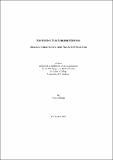Files in this item
Revisiting the sublime history: Dickens, Christianity, and The life of Our Lord
Item metadata
| dc.contributor.advisor | Longenecker, Bruce W. | |
| dc.contributor.author | Colledge, Gary | |
| dc.coverage.spatial | 310 | en |
| dc.date.accessioned | 2008-02-18T16:36:37Z | |
| dc.date.available | 2008-02-18T16:36:37Z | |
| dc.date.issued | 2008-06 | |
| dc.identifier | uk.bl.ethos.552076 | |
| dc.identifier.uri | https://hdl.handle.net/10023/422 | |
| dc.description.abstract | While the study of Charles Dickens’s religion has produced various results, few would contest that Dickens’s religious views are shaped by his peculiar emphasis on Jesus and the Gospels. As to the precise nature of his views and the degree to which his commitment to the Christian faith extends, however, a much lesser degree of consensus has been established. I attempt to demonstrate here that at the heart of his work is a conspicuous Christian worldview, which is grounded squarely in the imitation of Jesus and which pervades his life and his work in the most profound yet unobtrusive ways. I argue, then, that Dickens’s The Life of Our Lord is a definitive source in the Dickens corpus for our understanding of his Christian thought and worldview. Moreover, as a serious expression of Dickens’s understanding of Christianity, The Life of Our Lord also functions as an index to his Christian thought in the larger Dickens corpus. Of first importance then, I attempt to establish the authority of The Life of Our Lord as a composition that will bear the full weight of such assertions. Then, I analyze its content as to its implicit theology in order to establish not only its thoroughgoing Christian character but also to demonstrate that it reveals Dickens’s own genuine Christian conviction manifested in all his work. Drawing the work to a close, I attempt to demonstrate how The Life of Our Lord helps us to understand Dickens’s churchmanship and his relationship to the church. In the end, I comment on its intended purpose as moral instruction for his children exemplifying his understanding of Christianity. The study demonstrates throughout how the Christianity embodied and articulated in The Life of Our Lord is consistently and naturally reflected in all of Dickens’s work, whether fiction, journalism or correspondence. | en |
| dc.format.extent | 2476539 bytes | |
| dc.format.mimetype | application/pdf | |
| dc.language.iso | en | en |
| dc.publisher | University of St Andrews | |
| dc.rights | Creative Commons Attribution-NonCommercial-NoDerivs 3.0 Unported | |
| dc.rights.uri | http://creativecommons.org/licenses/by-nc-nd/3.0/ | |
| dc.subject | Charles Dickens | en |
| dc.subject | The life of Our Lord | en |
| dc.subject | Christianity | en |
| dc.subject | Jesus | en |
| dc.subject | Gospels | en |
| dc.subject | Religion | en |
| dc.subject.lcc | PR4592.R4C7 | |
| dc.subject.lcsh | Dickens, Charles, 1812-1870--Criticism and interpretation | en |
| dc.subject.lcsh | Dickens, Charles, 1812-1870. Life of Our Lord | en |
| dc.subject.lcsh | Dickens, Charles, 1812-1870--Religion | en |
| dc.subject.lcsh | Christianity and literature | en |
| dc.title | Revisiting the sublime history: Dickens, Christianity, and The life of Our Lord | en |
| dc.type | Thesis | en |
| dc.type.qualificationlevel | Doctoral | en |
| dc.type.qualificationname | PhD Doctor of Philosophy | en |
| dc.publisher.institution | The University of St Andrews | en |
| dc.publisher.department | St. Mary's College, School of Divinity | en |
This item appears in the following Collection(s)
Except where otherwise noted within the work, this item's licence for re-use is described as Creative Commons Attribution-NonCommercial-NoDerivs 3.0 Unported
Items in the St Andrews Research Repository are protected by copyright, with all rights reserved, unless otherwise indicated.


